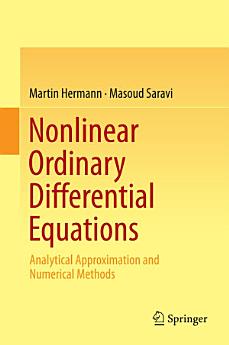Nonlinear Ordinary Differential Equations: Analytical Approximation and Numerical Methods
ଏହି ଇବୁକ୍ ବିଷୟରେ
The book explains various methods for solving nonlinear-oscillator and structural-system problems, including the energy balance method, harmonic balance method, amplitude frequency formulation, variational iteration method, homotopy perturbation method, iteration perturbation method, homotopy analysis method, simple and multiple shooting method, and the nonlinear stabilized march method. This book comprehensively investigates various new analytical and numerical approximation techniques that are used in solving nonlinear-oscillator and structural-system problems. Students often rely on the finite element method to such an extent that on graduation they have little or no knowledge of alternative methods of solving problems. To rectify this, the book introduces several new approximation techniques.
ଲେଖକଙ୍କ ବିଷୟରେ
MARTIN HERMANN is professor of numerical mathematics at the Friedrich Schiller University (FSU) Jena, Germany. His activities and research interests are in the field of scientific computing and numerical analysis of nonlinear parameter-dependent ordinary differential equations (ODEs). He is also the founder of the Interdisciplinary Centre for Scientific Computing (1999), where scientists of different faculties at the FSU Jena work together in the fields of applied mathematics, computer sciences and applications. Since 2003, he has headed an international collaborative project with the Institute of Mathematics at the National Academy of Sciences Kiev (Ukraine), studying, for example, the sloshing of liquids in tanks. Since 2003, Dr. Hermann has been a curator at the Collegium Europaeum Jenense of the FSU Jena (CEJ) and the first chairman of the Friends of the CEJ. In addition to his professional activities, he volunteers in various organizations and associations. In German-speaking countries, his books Numerical Mathematics and Numerical Treatment of ODEs: Initial and Boundary Value Problems count among the standard works on numerical analysis. He has also produced over 70 articles for refereed journals.
MASOUD SARAVI is professor of mathematics at the Shomal University, Iran. His research interests include the numerical solution of ordinary differential equations (ODEs), partial differential equations (PDEs), integral equations, differential algebraic equations (DAE) and spectral methods. In addition to publishing several papers with his German colleagues, Dr. Saravi has published more than 15 successful titles on mathematics. The immense popularity of his books is a reflection of his more than 20 years of educational experience, and a result of his accessible writing style, as well as a broad coverage of well laid-out and easy-to-follow subjects. He has recently retired from Azad University and cooperates with Shomal University and is working together with the Numerical Analysis Group and the Faculty of Mathematics and Computer Sciences of FSU Jena (Germany). He started off his academic studies at the UK’s Dudley Technical College before receiving his first degree in mathematics and statistics from the Polytechnic of North London, and his advanced degree in numerical analysis from Brunel University. After obtaining his M.Phil. in applied mathematics from Iran’s Amir Kabir University, he completed his PhD in numerical analysis on solutions of ODEs and DAEs by using spectral methods at the UK’s Open University.




